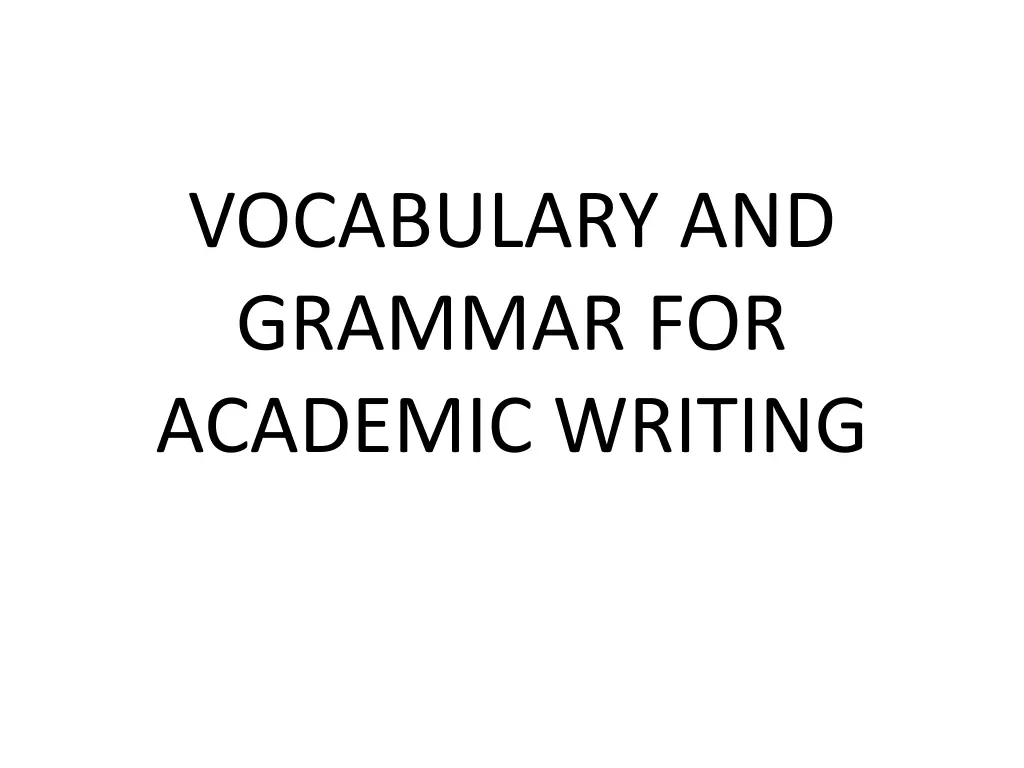
Effective Strategies for Academic Writing: Vocabulary and Grammar Tips
Enhance your academic writing by using appropriate vocabulary, avoiding informal expressions, employing discourse markers, and utilizing the Academic Word List. Learn to avoid common mistakes such as contracted forms, phrasal verbs, intensifiers, and informal transition words.
Download Presentation

Please find below an Image/Link to download the presentation.
The content on the website is provided AS IS for your information and personal use only. It may not be sold, licensed, or shared on other websites without obtaining consent from the author. If you encounter any issues during the download, it is possible that the publisher has removed the file from their server.
You are allowed to download the files provided on this website for personal or commercial use, subject to the condition that they are used lawfully. All files are the property of their respective owners.
The content on the website is provided AS IS for your information and personal use only. It may not be sold, licensed, or shared on other websites without obtaining consent from the author.
E N D
Presentation Transcript
VOCABULARY AND GRAMMAR FOR ACADEMIC WRITING
How to ensure a formal written work is --- effective, grammatically correct and free from mistakes: Appropriate vocabulary has to be used Avoid colloquial, slang terms, non standard diction and conversational style Variety of sentences have to be used length, word order and types of different types Wordy/redundant sentences to be avoided Parallelism can be used Tenses to be used with care Use strong verbs
VOCABULARY Academic word list to be referred Informal words/expressions to be avoided Discourse markers to link ideas and signal transition Writing- less wordy
Academic word list Averil Coxhead (Victoria Univ) first to compile such a list. Her list has 570 words Some of the frequently used words are- Analysis, assessment, benefit, consistent, create, data, derived, environment, function, indicate, involved, legal, method, response, section, significant, theory .. Other AWL- West s General Service List, Oxford 3000
Words and phrases to be avoided: Contracted forms-can t, doesn t Phrasal verbs- go on, put off, find out Intensifiers, emphasis words- a bit, a lot of, totally, really Informal transition- so, but, also, plus 1st/2ndperson point of view- I, me, us, we, you, your Run on expressions-etc, so on, so forth Unsophisticated/too simple expressions- bad, good, nice , cheap Absolute quantities all, every Superlatives- best, worst, most, always Informal expressions (used in letters) hi, cheers, yours truly Common abbreviations- ASAP, OK, TV, net, cell Slang terms- dude, cool, chap, lad Cliched expressions- last but not the least, time will tell, opposites attract
Subjective expressions- beautiful, ugly, wonderful, horrible, awesome Vague/impolite expresions- thing, stuff, sort of, more or less Ethnic slurs/racist expressions- nigger, Paki, ABCD, coloured, Madrassi Discriminatory words ( handicapped, crippled, autistic, imbecile, retard Words that are not gender specific- mankind, actress, female pilot, waitress, layman Approximations- nearly, almost, about, around, Texting language- asap, b4, btw Non standard language ain t, theirselves, hisself,
Filler words/ empty phrases just so, really, the fact that, at all times Redundant phrases-absolutely essential, each and every, advance warning, assemble together, completely destroy, future plans Excessive use of qualifiers appears, seems, indicates, might have been, probably, possibly, unlikely Absolutes- will, is, are, was, were, never Expressions showing personal judgement- I agree, I am convinced, I am sure that
Avoid Contacted forms full words Don t, won t, shouldn t do not, will not, Personal pronouns as in In this essay, I have argued . In this essay it is argued From the evidence, we can perceive some visible changes ..From the evidence, some visible changes can be noted Informal verbs/phrasal verbs ..formal verbs Bad, good, go on ..inferior, acceptable, Use instead
Colloquial expressions Formal words Sooner or later . inevitably part and parcel of intrinsic Run on expressions use conjunctions etc. .. And Redundant expressions remove unnecessary part .absolutely essential (essential), actual facts( facts), Vague expressions use clearer words Thing, stuff ..
Superlative expressions tone down phraseology perfect, best, worst, most (ideal, unfavourable, practically, consistently) Subjective expressions ..use alternatives Of course, obviously, beautiful (perceptibly, vividly, reasonable) Gendered expressions ..gender inclusive expressions( fireman, chairman ..firefighter, chairperson) Personal usage( I think, I believe .as shown in the table, it is evident from the text)
Use formal discourse markers instead of informal ones ( page 80, 81) Types of sentences (clause structure) Independent( main) and dependent(subordinate) Main clause can stand alone but subordinate clause cannot( page 83) Avoid use of fragments (84) Subject-verb agreement(85,86) Consistent use of tenses(87) Parallelism(88) Avoiding wordiness(89,90,91)
